If you want to master Korean, you need to be able to ask and answer questions in Korean.
Well, you can just ask a question by changing the pitch of your voice.
but questions in Korean can be tricky. So here we go with a few tips and tricks to help you out.
This article teaches you the most common types of questions and how to answer them with examples and exercises. It comes with a fun flashcard deck and a printable quiz sheet for easy reference and review
So, Are you ready? Let’s dig in (to the core)
Table of Contents
How to Ask a Question in Korean? -The Basic Rule
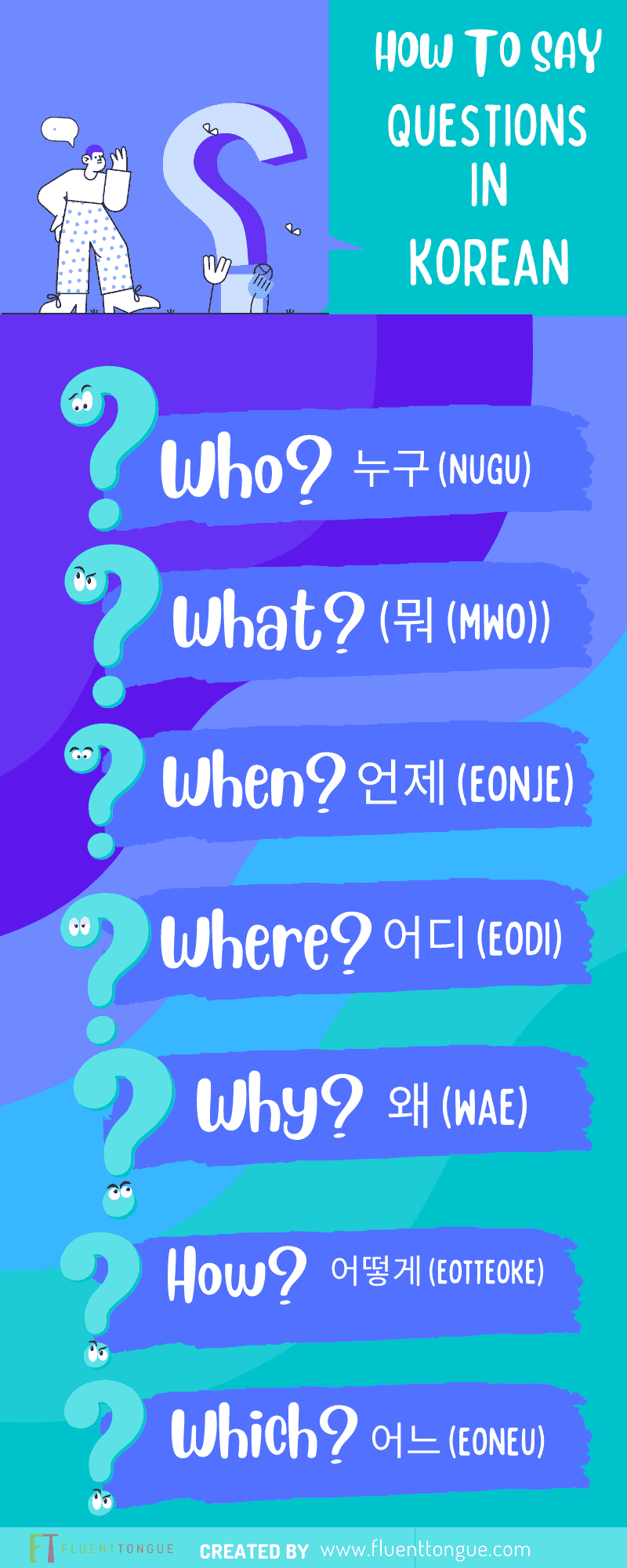
Knowing how to ask questions in Korean in the right way is essential.
The questions in Korean are Called 질문(jilmun). To ask a question in Korean, simply take the statement and make it a question by changing the pitch of your voice, and when writing, add a question mark at the end. Another way is to use Korean question words, which are 뭐 (mwo), 언제 (eonje), 어디 (eodi), 누구 (nugu), 왜 (wae).
Here’s a list of the 12 most common Korean question words for beginners
- What in Korean -뭐 (mwo)
- Where in Korean-어디 (eodi)
- Why in Korean -왜 (wae)
- When in Korean-언제 (eonje)
- How in Korean -어떻게 (eotteoke)
- How many-몇 (myeot)
- Who in Korean -누구 (nugu)
- Which in Korean-어느 (eoneu)
- What kind of-어떤 (eotteon)
- What (kind of)-무슨 (museun)
- How many/much/long-얼마나 (eolmana)
- How much-얼마 (eolma)
Here are the two ways in which questions are phrased in Korean
- By turning a statement into a question in Korean changing the pitch of your voice
- By using Korean question words
Even if you stumble, you can always say I’m sorry and keep trying.
After all, How else do you learn without saying it in real life?
TURNING A STATEMENT INTO A QUESTION
The easiest way to ask questions in Korean is simply to take any statement and make it a question by changing the pitch of your voice.
Well in Korean you don’t have to learn new sentence structures for this.
Korean simple questions (questions without question words) follow the same word order.
In writing, this can be done by adding a question mark at the end of the sentence.
For example, when you ask yes/no questions like “Are you a student?”, “Do you like this movie?”, “Is this your book?”
you’ll also like these
Some examples in Korean:
- Are you a student?
학생이세요?- hakssaengiseyo?
- Were you busy yesterday?
어제 바빴어요? – oje bappassoyo
- Is this a pig?
이거 돼지예요? – igo dwaejieyo
- You like korea?
한국어 좋아해요? – hangugo joahaeyo
- Do you like kimchi?
김치 좋아하세요? – gimchi joahaseyo
- Do you want some more soju?
소주 더 마실래? – soju do masilrae
- Is it true?
사실인가요?sasiringayo
- Can you speak japanese?
일본어 할 수 있어요? ilbono hal su issoyo
- Do you want to eat pizza?
피자 먹을래?pija meog-eullae?
This is like in English, the expected reply is either a yes or a no.
To answer these questions in Korean, you simply have to add the Korean words for “yes” when you agree or “no” in Korean when you disagree with what the other person is saying.
Of course, not all questions in Korean simply require just changing the tone, that would be too easy.
Another method of asking questions is to use Korean question words.
But first, what are question words in Korean?
How to answer wh questions in Korean| use Korean Question words in sentences?
The Five common Korean question words are the 5 W’s (What, when, where, who and why) which are 뭐 (mwo), 언제 (eonje), 어디 (eodi), 누구 (nugu), 왜 (wae) that you need to know and how to use it to ask questions in Korean in real-life scenarios.
Below are the top 9 question words/combinations that you need to know.
| QUESTIONS IN ENGLISH | QUESTIONS IN KOREAN | ROMANIZATION |
|---|---|---|
| What in Korean | 뭐 | (mwo) |
| Where in Korean | 어디 | (eodi) |
| Why in Korean | 왜 | (wae) |
| When in Korean | 언제 | (eonje) |
| How many | 몇 | (myeot) |
| Who in Korean | 누구 | (nugu) |
| How in Korean | 어떻게 | (eotteoke) |
| Which in Korean | 어느 | (eoneu) |
| What kind of | 어떤 | (eotteon) |
| What (kind of) | 무슨 | (museun) |
| How much | 얼마 | (eolma) |
| How many/much/long | 얼마나 | (eolmana) |
Did you tick them all?
Hang on, one more thing to do to complete your Korean Vocabulary list.
How To use Korean Question words in real-life sentences
Here you go!
How to say “What” in Korean language?
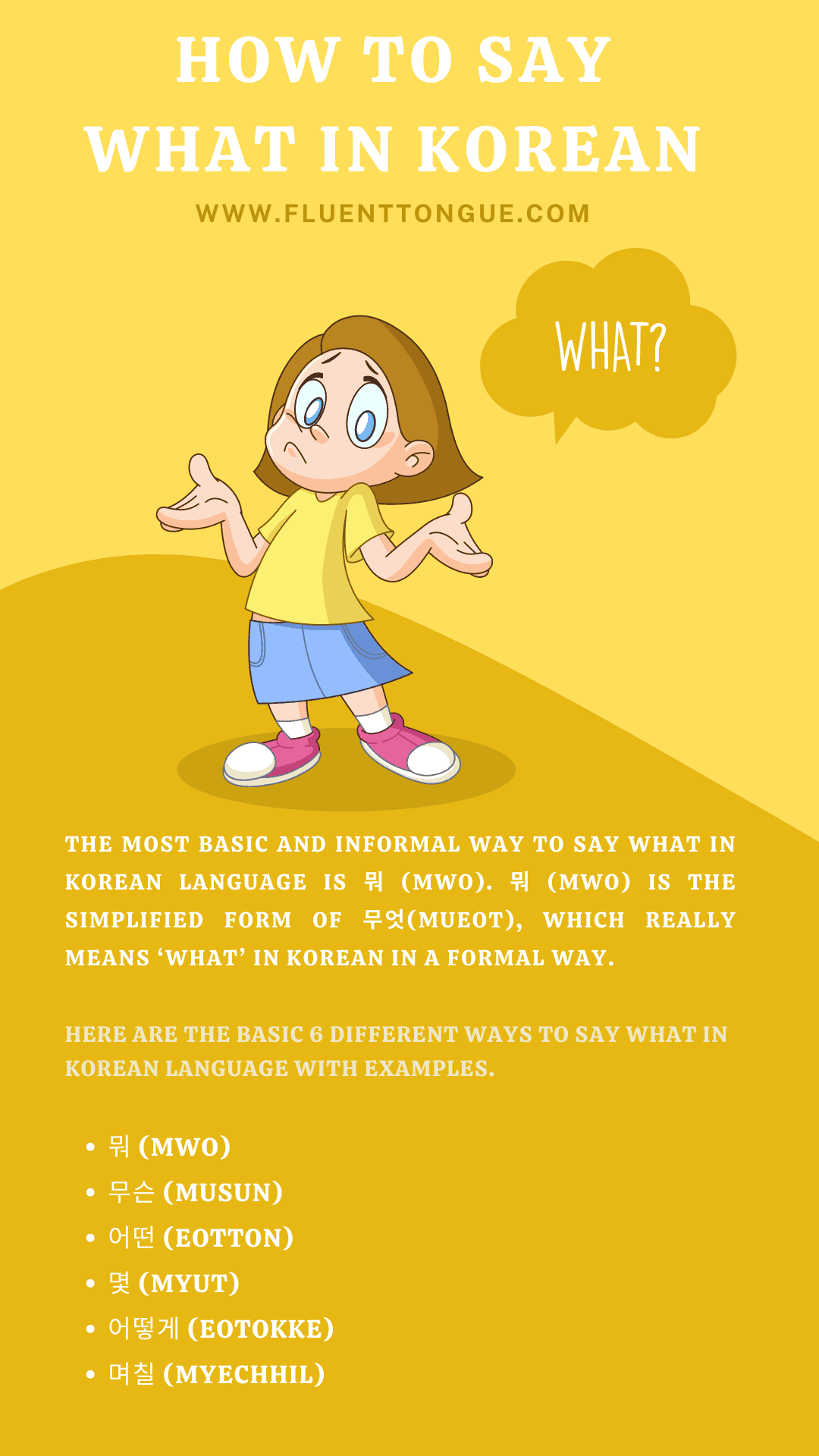
The most basic and informal way to say what in Korean language is 뭐 (mwo).
뭐 (mwo) is the simplified form of 무엇(mueot), which really means ‘what’ in Korean in a formal way.
The only difference between them 무엇(mueot) is used in written Korean and 뭐 (mwo) is used in everyday conversations.
Here are the basic 6 different ways to say what in Korean language with examples.
- 뭐 (MWO)
- 무슨 (MUSUN)
- 어떤 (EOTTON)
- 몇 (MYUT)
- 어떻게 (EOTOKKE)
- 며칠 (MYECHHIL)
뭐 (mwo)- the basic way to say what in Korean
뭐 (Mwo) is an abbreviated version of. is the most widely used. In a sentence, 뭐 should not be followed by any other noun.
example
- What’s your name?
이름이 뭐에요? – ileum-i mwo-eyo?
- What do you want to eat?
뭐 먹고 싶어 – mwo mokkko sipo
- What is this?
이게 뭐야? -ige mwoya
- What is that noise?
저 소음 뭐에요?
- Do you see the problem?
뭐가 문제인지 알겠어? – mwoga munjeinji algesso
- What are you doing?
뭐하세요? – mwohaseyo?
- May I ask you something?
뭐 좀 물어 봐도 되겠습니까?mwo jom muro bwado dwegetsseumnikka
How to say 무슨 (Musun) in Korean sentences?
When the word what is followed by a noun, we use 무슨 (Musun), and cannot be utilized on its own.
Here’s the basic structure to use 무슨 (Musun) in a Korean sentence.
무슨 (Musun) + noun
- What music do you listen to?
무슨 음악 들어?museun eumak deuro?
- What do you mean?
무슨 뜻이야? – museun tteusiya
- Do you understand my words?
내 말 무슨 뜻인지 알겠니?nae mal museun tteunninji algenni
- What day is it?
오늘 무슨 날이에요?
- What are you trying to say?
넌 무슨 말을 하려는 거니? – non museun mareul haryoneun goni
- What does this sentence mean?
이 문장은 무슨 뜻인가요?i munjangeun museun tteusingayo
- Are there any other questions?
무슨 다른 질문 있으세요?museun dareun jilmun isseuseyo
What is 몇(Myeot) in Korean
몇(Myeot) literally means how many and it is used to ask about numbers. 몇 is always followed by a noun which is a counting unit.
Example sentences
- 몇 월이에요? – What month is it?
- 몇년도예요? – What year is it?
- 몇 시예요? – What time is it?
What is 며칠 (MYeochhil)?
며칠 (MYeochhil) means what date which comes from the word 며칟날.
Example
- What’s the date?
며칠이야?
- What date is it tomorrow?
내일 며칠 이에요?
- What date is your wedding anniversary?
결혼기념일이 며칠이에요.
- What date are you leaving?
며칠에 출발해요?
- ‘What’s the date today?’ ‘The 10th.’ “
오늘이 며칠이지?” “10일이야.”
- What day shall we set up the meeting?
회의 날짜를 며칠로 잡을까요?
왜 (wae)| How to say “Why in Korean”?
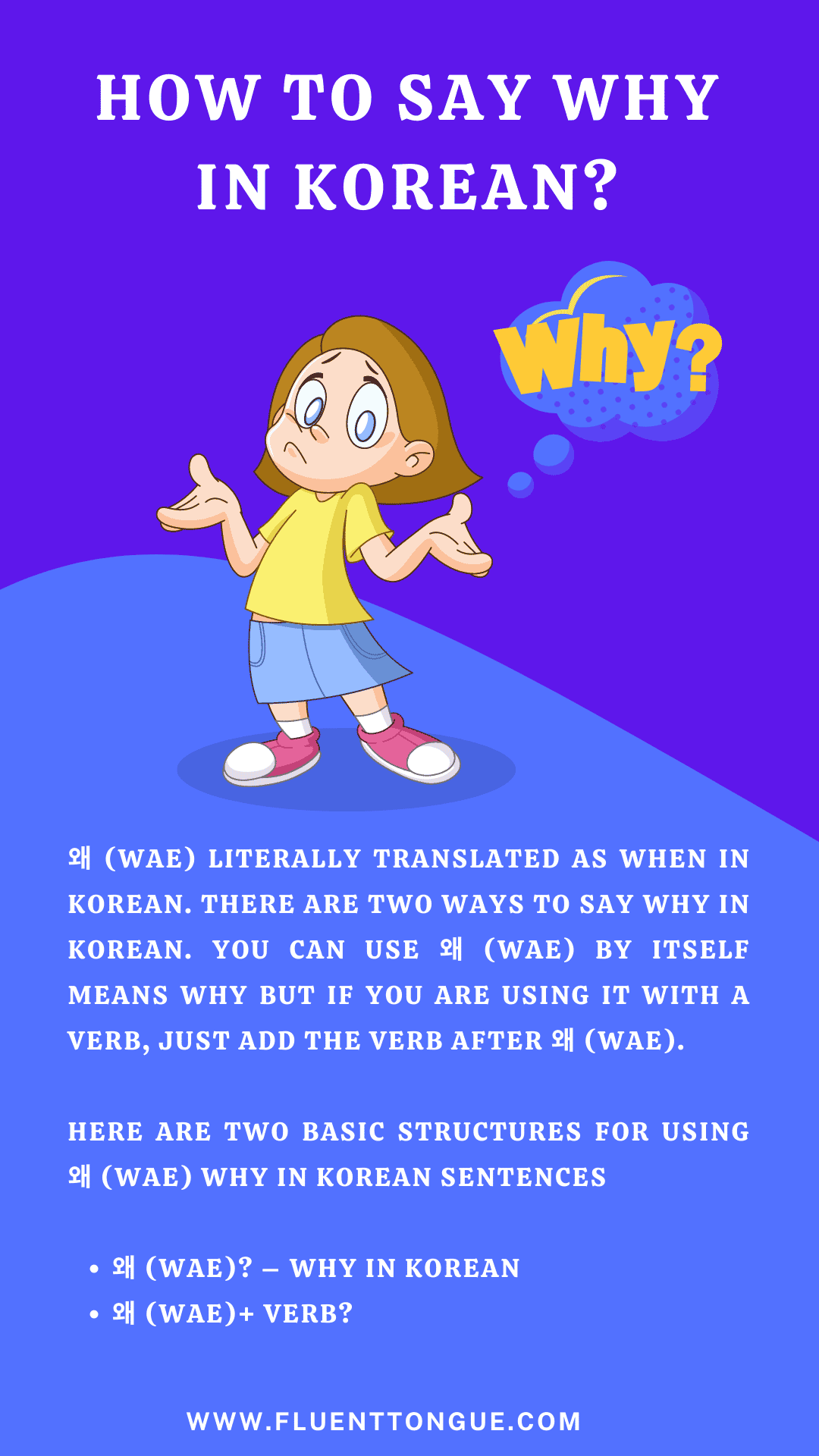
The formal version of why in Korean language is Wae (왜), the informal version of why in the Korean language is Wae-yo (왜요)
When Koreans are angry, upset, confused, and feel cheated they use this informal version of why Wae. It is usually used with friends and younger ones but when you are angry you can use this with anyone.
왜 (wae) literally translated as When in Korean. There are two ways to say why in Korean. you can use 왜 (wae) by itself means why but you are using it with a verb, just add the verb after 왜 (wae).
Here are two basic structures for using 왜 (wae) Why in Korean sentences
- 왜 (wae)? – why in Korean
- 왜 (wae)+ Verb?
For example:
- Why didn’t you do it?
왜 안 했어? – wae an haess-eo?
- Why are you like this?
왜그래? – waegeurae
- Why didn’t you call?
왜 전화 안 했어요?wae jonhwa an haessoyo
- Why did you buy that?
왜 그거 샀어? – wae geugo sasso
- Why didn’t you come?
왜 안왔어? wae an-wass-eo?
How to say Who in Korean language in 6 different ways?
누구 means who in Korean language but There are different types of who in Korean language. Here are 6 different ways to say ‘who’ in Korean 누가,누구를,누구한테(means from who),누구하고(with who),누구한테서(means whose).
Here are the 6 different ways to say who in Korean language.
- 누구 (nu-gu)- The basic way to say ‘who’ in Korean
- 누가(nuga) – how to use ‘Who’ As The Subject Of The Sentence
- 누구를 | how to use ‘who’ as the object of a sentence
- 누구하고 = with who
- 누구한테 = to who
- 누구한테서 = from who
- 누구의 = whose
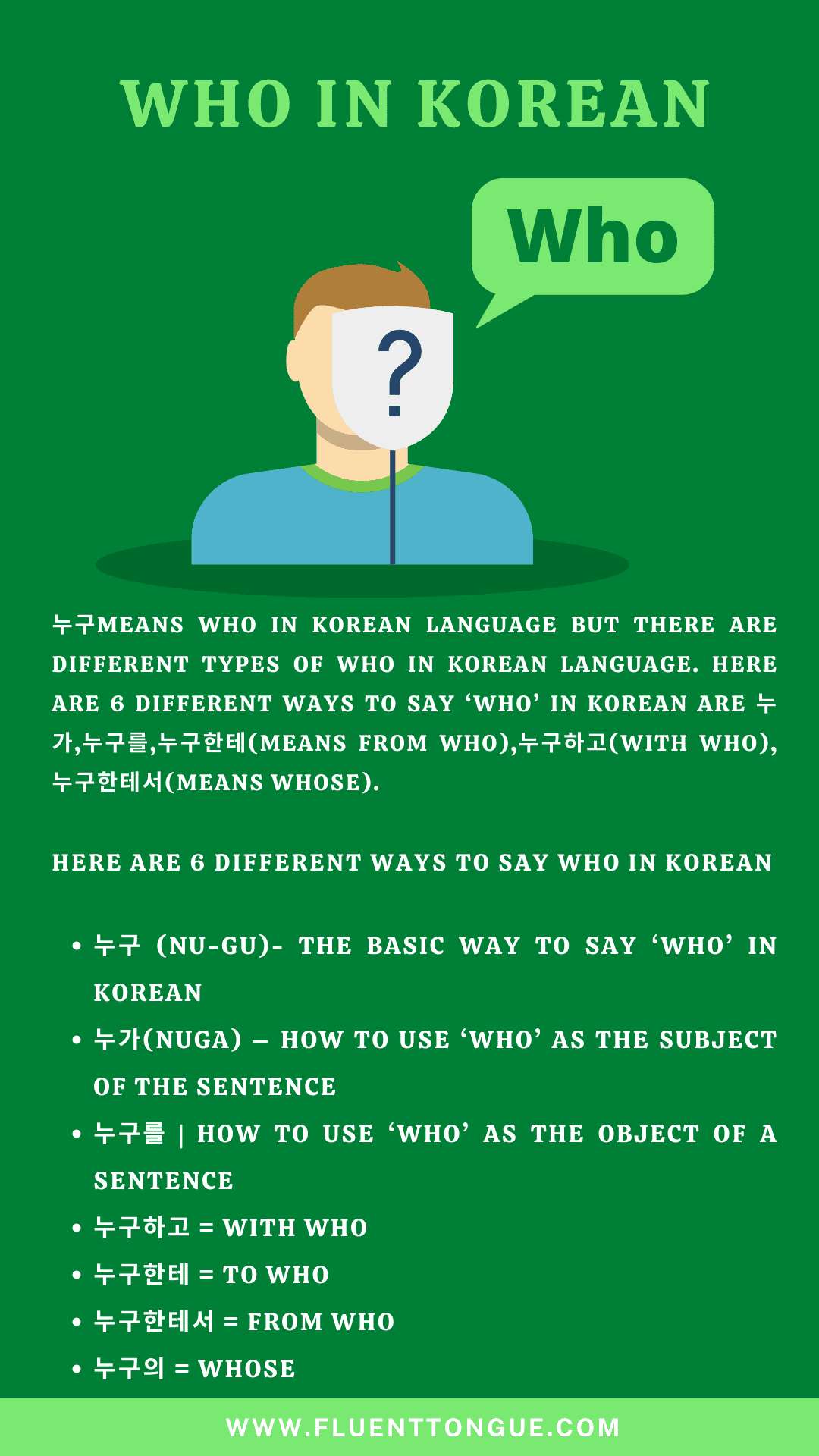
누구 (nu-gu)- The basic way to say ‘who’ in Korean
The standard informal way to say ‘who’ in the Korean language is 누구 (nu-gu).
누구 can be used in six different ways, as 누가, 누구를,누구한테(means from who),누구하고(with who) and 누구한테서depending on the particle that is attached to it.
For example
- Who are you?
누구세요?
- Whose birthday is it today?
오늘 누구 생일이야”?oneul nugu saeng-il-iya
- Who does this watch belong to?
이 시계 누구 거죠?- i sigye nugu gojyo
- Who did you meet?
누구 만났어? – nugu mannass-eo?
- Who’s your teacher?
선생님은 누구세요?sonsaengnimeun nuguseyo
- Who is that person?
그 사람은 누구예요?
- Who is your favorite actor?
가장 좋아하는 배우는 누구예요?gajang joahaneun baeuneun nugueyo
누가(nuga) – how to use ‘Who’ As The Subject Of The Sentence
You can use 누가(nuga) when you make who as the subject Of The Sentence comes from the word 누구가. It is made up of 누구(nugu) and 가(subject marking particle).
Example
- Who did it?
누가 그랬어? – nuga geulaess-eo?
- Who wants the last piece of candy?
마지막 남은 캔디 누가 먹을래?
- Who will do that?
누가 할까요?nuga halkkayo
- Who laughed?
누가 웃었어?
- Who lived in this apartment?
이 아파트에 누가 살았어요?
- Who said that?
누가 말했다?nuga malhaessda?
누구를 | how to use ‘who’ as the object of a sentence
If you want to use ‘who’ as the object of a sentence, you can say 누구를.
It is made up of 누구 and 를 which is the object marking particles.
In spoken language, 누구를 is often shortened to 누구.
- Who’s the money for?
누구를 위한 돈인가? – nuguleul wihan don-inga?
- Whom do the police suspect?
경찰이 누구를 의심하고 있나요?
- Have you decided who you’re going to hire?
누구를 채용할 건지 결정했어요?
- Who would you recommend highly for the job?
이 자리에 누구를 적극 추천하시겠습니까?i jarie nugureul jokkkeuk chuchonhasigetsseumnikka
누구하고 = with who
누구하고 is literally translated as ‘who with’ and is made up of 누구 plus the particle 하고 which means.
누구랑 and 누구와 also mean ‘who with’ in Korean.
누구하고 and 누구랑 are often used in dalily life conversation.
Example
- Who are you gonna play with?
누구하고 칠건데?
- Who were you talking to just now?
너 방금 누구랑 이야기했니?
- Who did you hang out with?
누구하고 놀았어요?
누구한테 = to who
누구한테 literally means ‘to who’ in Korean. it is made up of the word 누구(nugu) and the particle 한테 which means ‘to’.
The word 누구에게 also means ‘to who’ in Korean.
The basic difference between 누구한테 and 누구에게 is that the first one is used in spoken language and 누구에게 is used in written language while asking questions in Korean.
Example
Whom did you call?
누구한테 전화했어요?nuguhante jonhwahaessoyo
Who did you hear that from?
누구한테 들었어?
Who gave you chocolate?
초콜릿 누구한테 받았어?chokolrit nuguhante badasso
Who are you going to give this dress to?
이 드레스 누구한테 줄 거예요?i deureseu nuguhante jul goeyo
누구한테서 = from who
누구한테서 means ‘from who’ in Korean. It is made up of 누구 and the particle 한테서 which translates as ‘from’.누구에게서 also means ‘from who’.
The only difference between them 누구에게서 and 누구한테서 is that Korean use the first one in the written language and 누구에게서 is used in daily life conversation.
Example
Who else is calling?
또 누구한테서 전화 와요?tto nuguhanteso jonhwa wayo
Who did you borrow that car from?
누구한테서 그 차를 빌렸어요?
누구의 = whose
누구의(nuguui) literally means” whose /of who” in Korean. It is made up of 누구(nugu) and the possessive particle “의” means ‘of’.
Example
Whose gift will you take?
누구의 선물을 받을 건가요?nuguui seonmul-eul bad-eul geongayo?
Whose voice it would be?
누구의 목소리가 될까요?nuguui mogsoliga doelkkayo?
Whose feet are they?
누구의 발일까요?nugue barilkkayo
whose room shall we go into?
우리는 누구의 방으로 들어갈까?ulineun nuguui bang-eulo deul-eogalkka?
When in Korean- 언제 (eonje)
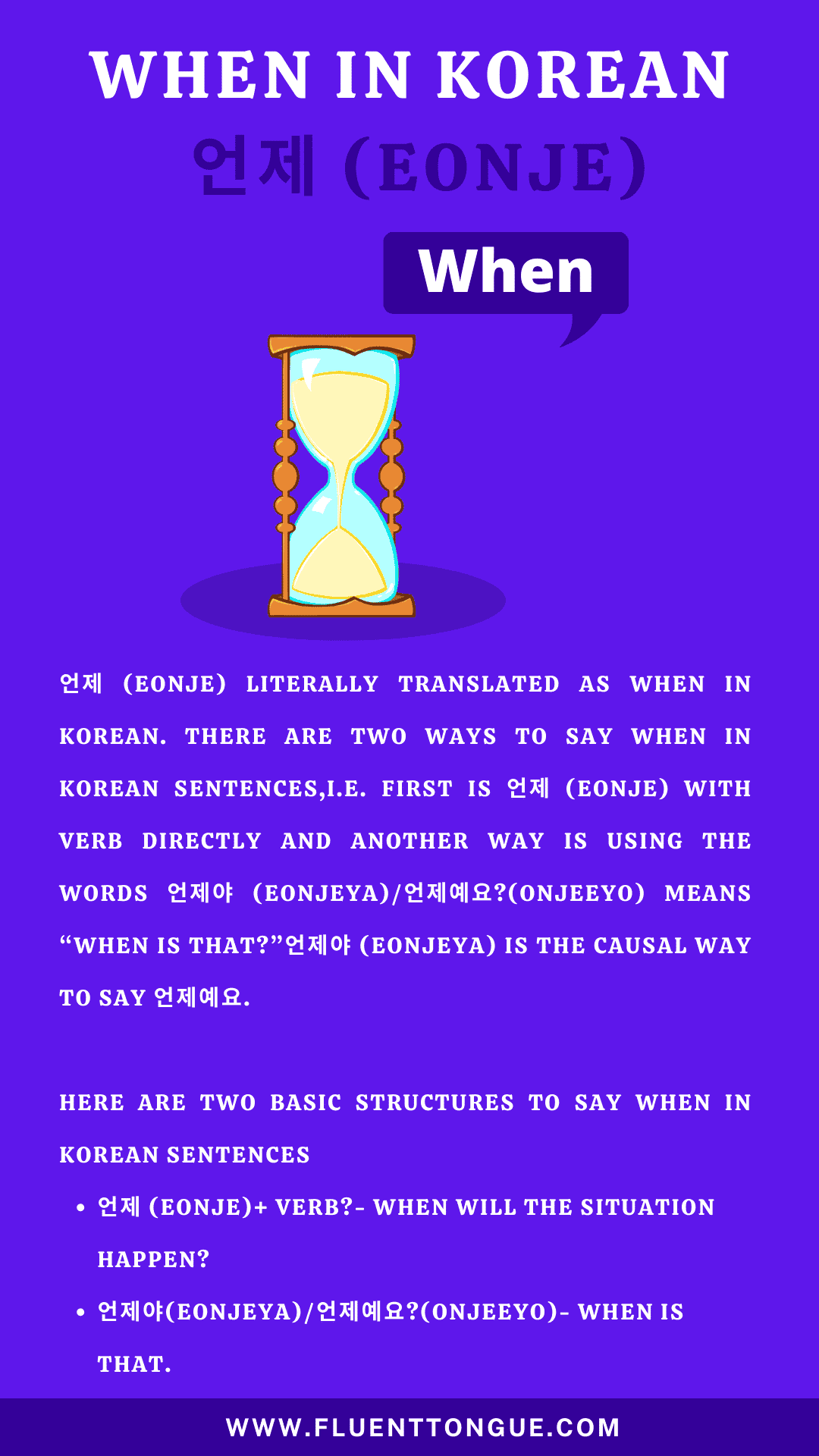
언제 (eonje) literally translated as When in Korean. There are two ways to say when in Korean sentences,i.e. first is 언제 (eonje) with Verb directly and another way is using the words 언제야 (eonjeya)/언제예요?(onjeeyo) means “when is that?”언제야 (eonjeya) is the causal way to say 언제예요.
Here are two basic structures to say When in Korean sentences
- 언제 (eonje)+ Verb?- When will the situation happen?
- 언제야 (eonjeya)/언제예요?(onjeeyo)- when is that.
For example:
- When did you go?
언제 갔어요? – onje gassoyo
- When does the exam start?
언제 시험 시작해? – onje sihom sijakae
- When is your birthday?
생일이 언제예요? – saengiri onjeeyo
- When do we eat?
언제 먹어요? onje mogoyo
- When did you come?
언제 왔어요? onje wassoyo
- When is our meeting?
우리 회의가 언제야?uri hweiga onjeya
- When did you get up?
언제 일어났어요? – onje ironassoyo
Where in Korean- 어디 (eodi)
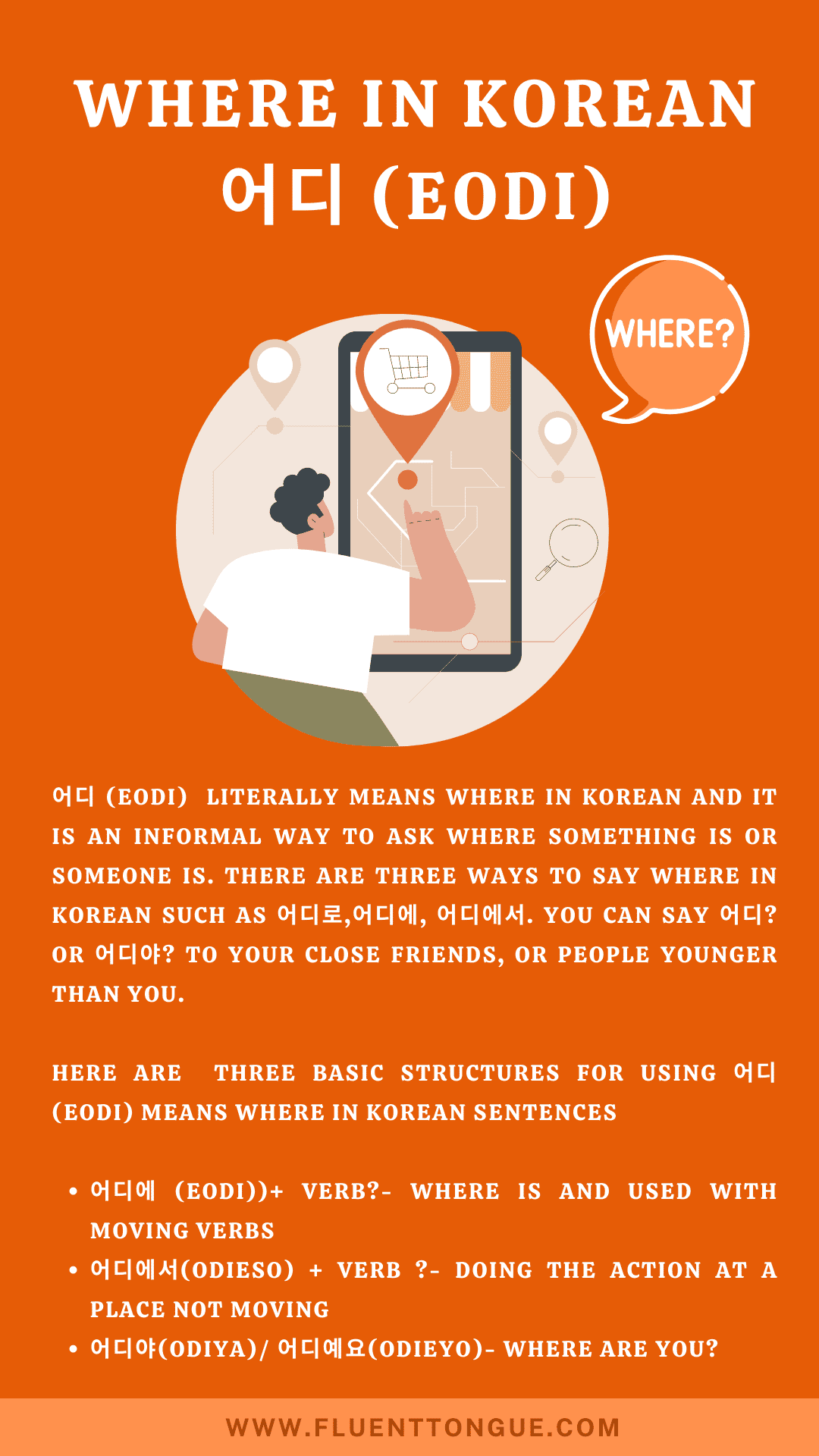
어디 (eodi) literally means Where in Korean and It is an informal way to ask where something is or someone is. There are three ways to say Where in Korean such as 어디로,어디에, 어디에서. You can say 어디? or 어디야? to your close friends, or people younger than you.
Here are three basic structures for using 어디 (eodi) means Where in Korean sentences
- 어디에 (eodi))+ Verb?- where is and used with moving verbs
- 어디에서(odieso) + verb ?- doing the action at a place not moving
- 어디야(odiya)/ 어디예요(odieyo)- means where are you?
For example:
- Where are you going?
어디에 가? – odie ga
- Where are you now?
지금 어디 있어요? – jigeum odi issoyo
- Where do you want to go?
어디 가고 싶어요? – odi gago sipoyo
- Where are you now?
너 지금 어디야? – no jigeum odiya
- Where is the baggage claim area?
수하물 찾는 곳이 어디예요?suhamul channeun gosi odieyo
- Where is the bathroom?
화장실은 어디예요?hwajangsireun odieyo
- Where do you live in London?
런던에서 어디 사세요?-rondoneso odi saseyo
- Where is your sister?
동생은 어디에 있어요? -dongsaengeun odie issoyo
Which in Korean- 어느 (eoneu)
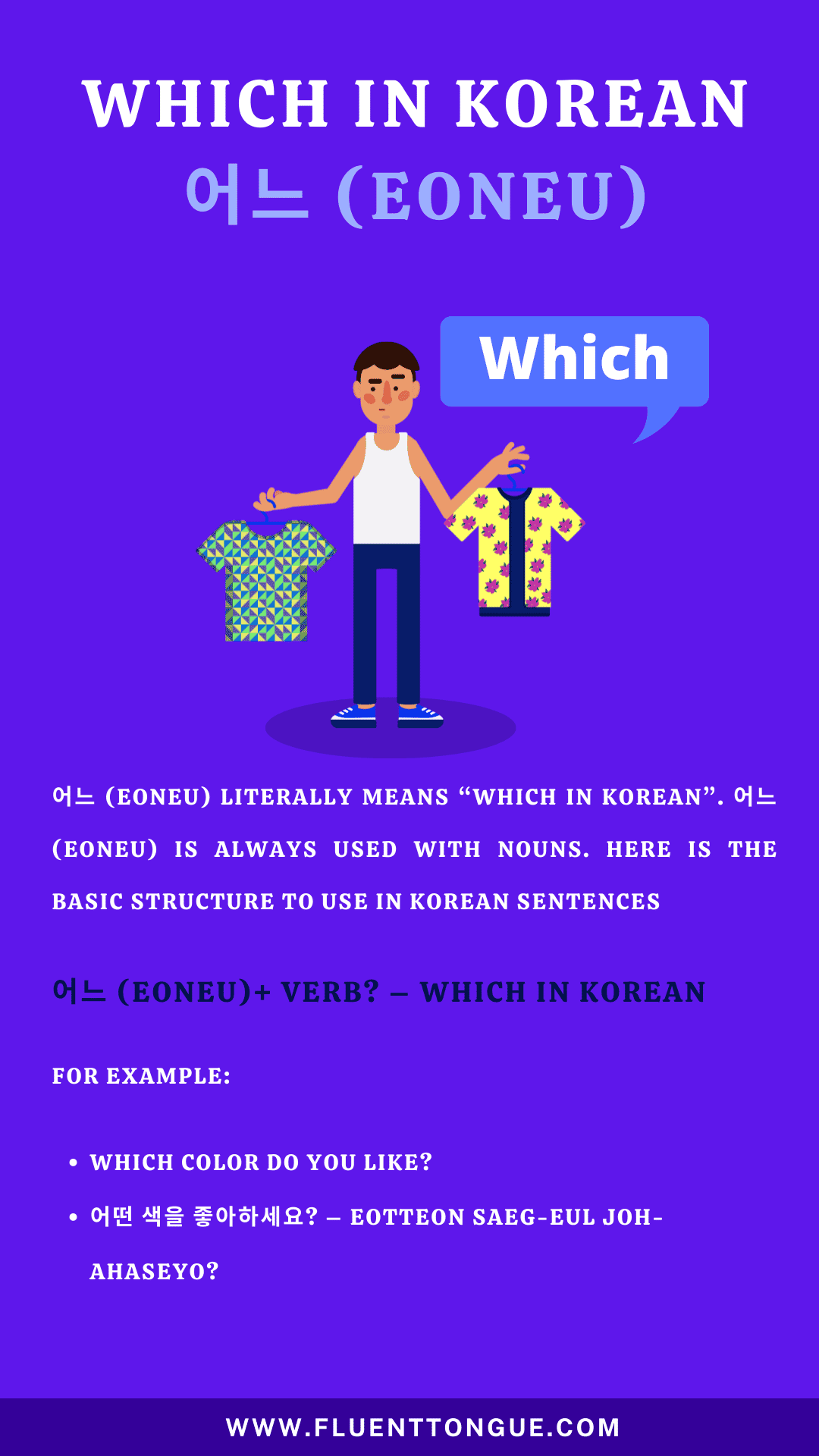
어느 (eoneu) literally means “which in Korean”. 어느 (eoneu) is always used with nouns. Here is the basic structure to use in Korean sentences
- 어느 (eoneu)+ Verb? – Which in Korean
For example:
- Which color do you like?
어떤 색을 좋아하세요? – eotteon saeg-eul joh-ahaseyo?
- Which country are you from?
어느 나라 사람이에요? – oneu nara saramieyo
어떻게 (eotteoke)-How to say “HOW” in Korean questions
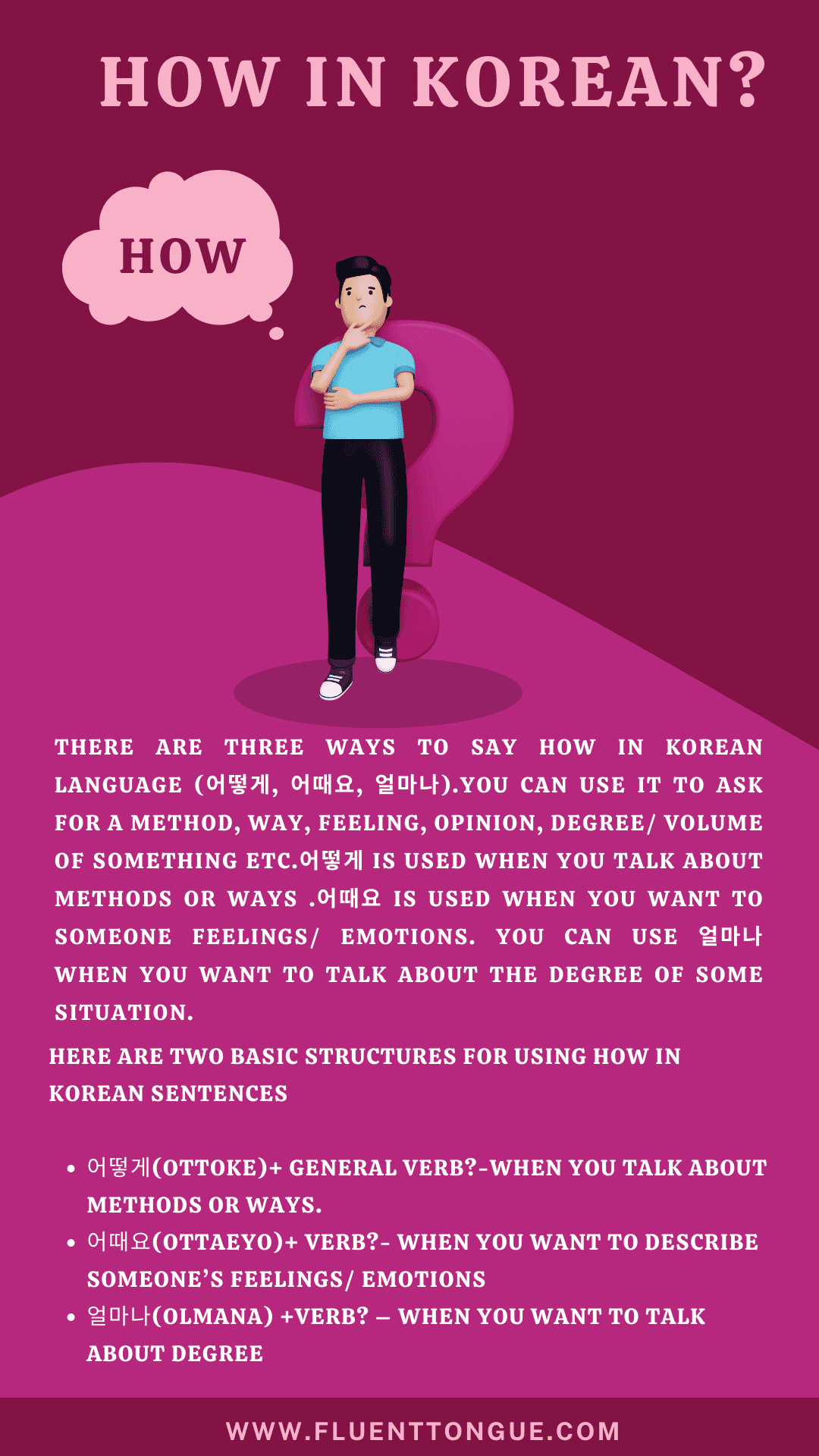
HOW is used to ask for a method, way, feeling, opinion, degree/ volume of something etc.
There are three ways to say how in Korean language (어떻게, 어때요, 얼마나).you can use it to ask for a method, way, feeling, opinion, degree/ volume of something etc.어떻게 is used when you talk about methods or ways .어때요 is used when you want to someone feelings/ emotions. You can use 얼마나 when you want to talk about the degree of some situation.
But there is an exception also. You can not use 얼마나 when asking the age of a person and the price of something.
Here are two basic structures for using how in Korean sentences
- 어떻게(ottoke)+ general Verb?-when you talk about methods or ways.
- 어때요(ottaeyo)+ verb?- when you want to describe someone’s feelings/ emotions
- 얼마나(olmana) +verb? – when you want to talk about a degree
For example:
- How did you do it?
어떻게 했어?
- How do you study Korean?
한국어를 어떻게 공부해요? – hangugoreul ottoke gongbuhaeyo
- How did you get here?
여기 어떻게 왔어요?yogi ottoke wassoyo
- How do you drive?
어떻게 운전해요?ottoke unjonhaeyo
- How did you make this kimchi?
이 김치 어떻게 만들었어요?i gimchi ottoke mandeurossoyo
- How is the weather like today?
오늘 날씨가 어때요?oneul nalssiga ottaeyo
- How did you find it?
어떻게 찾았어요? – ottoke chajassoyo
- How long should I walk a day to lose weight?
하루에 얼마나 걸어야 살을 뺄 수 있을까? – harue olmana goroya sareul ppael su isseulkka
- How is the weather in Seoul now?
지금 서울의 날씨는 어때요 – jigeum soure nalssineun ottaeyo
What (kind of)-무슨 (museun)
무슨 (museun) literally translated as “What sort of ” in Korean. Koreans use 무슨 (museun) with nouns to ask what kind of/ what sort of questions in Korean.
Here is the basic structure
무슨 (museun)+ Verb
For example:
- What kind of book is it?
무슨 책이에요? – museun chaegieyo
- What kind of movies do you like?
무슨 영화를 좋아하세요? – museun yonghwareul joahaseyo?
- What kind of exercise do you like?
무슨 운동을 좋아하세요? – museun undongeul joahaseyo
How many/much/long-얼마나 (eolmana)
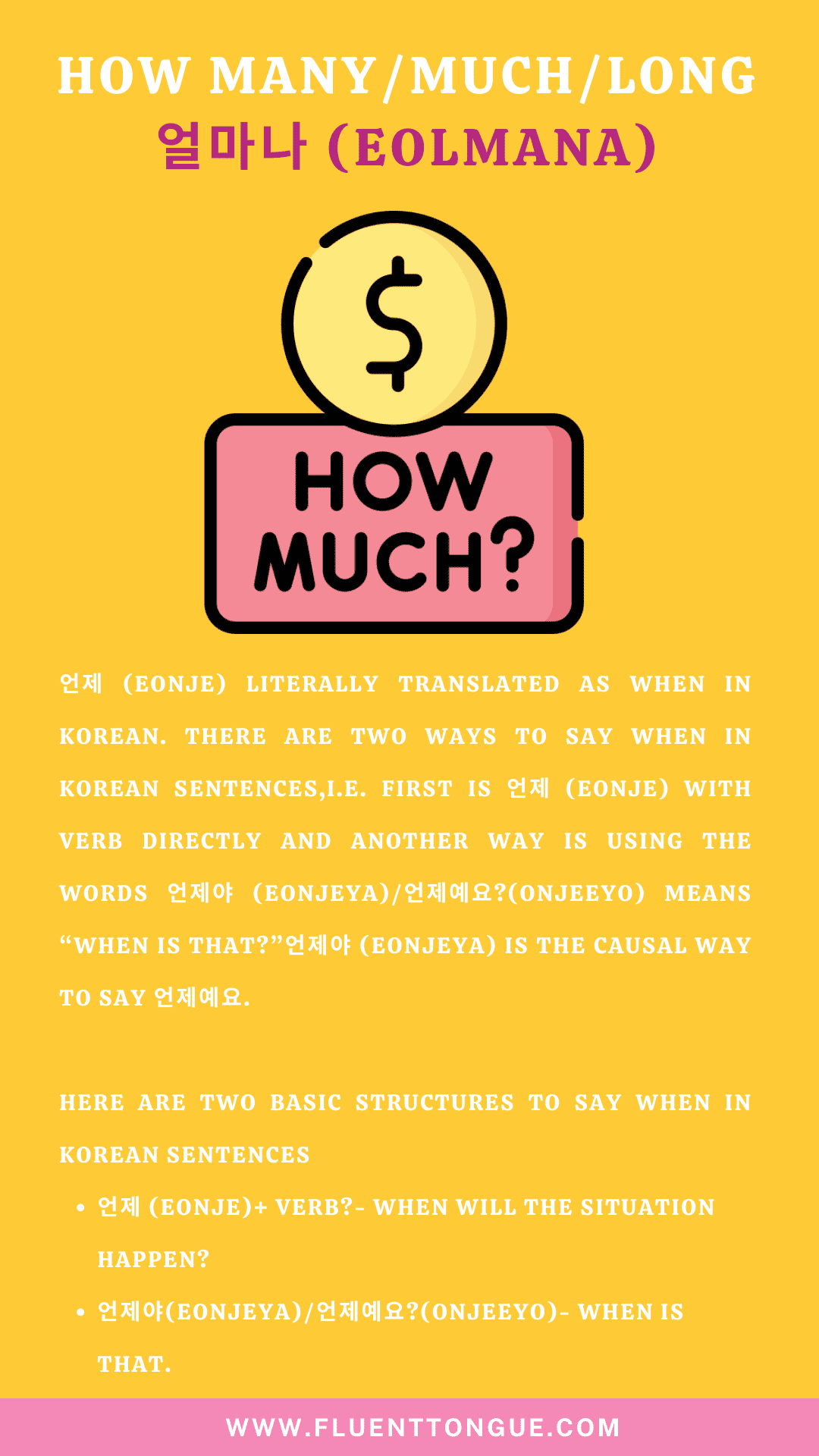
얼마나 (eolmana) literally translated as How many in Korean. There are two ways to say it. how long in Korean is 얼마 동안(olma dongan). If you want to say How much is it in Korean, just use the word 얼마야(olmaya)/얼마예요(olmaeyo). Here are three basic structures for using 얼마나 (eolmana) in sentences
- 얼마나 (eolmana) + Verb?- how many
- 얼마 동안(olma dongan) +verb – how long in korean
- 얼마야(olmaya)/얼마예요(olmaeyo) – How much is it in korean
For example:
- How much is this?
이거 얼마예요? – igo olmaeyo
- How much are you going to sleep?
얼마나 잘 거예요?olmana jal goeyo
- How much soju are you going to drink?
소주 얼마나 마실 거야? soju olmana masil goya
- How much are you going to spend on makeup?
메이크업에 얼마나 쓸 거야? – meikeuobe olmana sseul goya
- How long does it take?
얼마나 걸려? – olmana golryo
- How long have you studied?
얼마나 공부했어요? – olmana gongbuhaessoyo
- How big is it?
얼마나 커요? – olmana koyo
- How heavy is it?
얼마나 무거워요?- olmana mugowoyo
- How many people were there at the concert?
그 콘서트에는 사람이 얼마나 왔나요?
- How much is this watermelon?
이 수박은 얼마예요? – i subageun olmaeyo
How many-몇 (myeot)
몇 (myeot) literally translated as “how many” Korean. It is always used before a classifier/counter. To say 몇 (myeot) in Korean just add the type of classifier after the word 몇 (myeot).
Here are the basic structure for using 언제 (eonje)When in Korean sentences
- 몇 (myeot)+ classifier/counters?
For example:
- How many pens do you have?
펜이 몇 개 있어요?- peni myot gae issoyo
- How many spoonfuls of sugar would you like?
몇 개월 할부로 해 드릴까요?
- How many students are there?
몇 가지 외국어를 구사할 수 있습니까?
- How many foreign languages do you speak?
너는 지금 연필을 몇 자루 가지고 있니?
- How many pencils do you have now?
동물원에는 얼룩말이 몇 마리 있어요?
- How many zebras are there in the zoo?
설탕은 몇 스푼 넣을까요?
- How many monthly installments would you like?
샐러드를 위해 사과가 몇 개 필요합니까?
- How many apples do we need for the salad?
이번 학기에 몇 과목을 수강하셨어요?
- How many courses did you take this semester?
이번 학기에는 몇 과목을 들으세요?
15 essential questions in Korean you Need to Know before you travel to Korea.
If you’re on a short trip to Korea and looking for some survival Korean phrases, this isn’t the right place. But if you have just started to learn Korean, these are the basic question phrases you’ll encounter frequently in your daily life in Korea.
Just memorize these phrases and you’ll be able to explain your purpose of stay whenever you are asked before you even go to Korea on a vacation, study, or business trip.
- What’s your name? – 이름이 뭐예요?ireumi mwoeyo
- How are you?- 어떻게 지내세요?ottoke jinaeseyo
- What’s your phone number? – 전화번호가 뭐예요jonhwabonhoga mwoeyo
- What did you say? – 뭐라고 하셨나요?(mworago hasyonnayo)
- When is your birthday? – 생일이 언제예요?
- How old are you?- 몆 살이세요
- Where do you live? – 어디에 사세요?odie saseyo
- Where do you work? – 어디에서 일해요?odieso ilhaeyo
- What is your annual salary? – 연봉이 얼마예요?yonbongi olmaeyo
- What is this? – 이게 뭐예요?ige mwoeyo
- Do you like Korean food? – 한국 음식을 좋아하세요?hangug eumsig-eul joh-ahaseyo?
- Where did you learn Korean?
- 한국어는 어디서 배웠어요?hangugoneun odiso baewossoyo
- Have you been to Korea?
- 한국에 가본 적이 있습니까?hanguge gabon jogi itsseumnikka
- Where is the bathroom?
- 화장실은 어디예요?hwajangsireun odieyo
- Can you speak korean?-한국말 할 수 있어요?hangungmal hal su issoyo
- Do you speak English? 영어를 할 줄 아세요?yongoreul hal jul aseyo
- What time do you open/close? -몇시에 가게를 여세요?myeochsie gageleul yeoseyo?
- Can you please tell me one more time?
한 번 더 설명해 주시겠습니까?han bon do solmyonghae jusigetsseumnikka
- Could you repeat that, please?
다시 한 번 말씀해 주시겠어요?dasi han bon malsseumhae jusigessoyo
The best way to memorize Korean Question words
Use Flashcard And Test
I know it’s an old thing(you might be using Anki too)
But When it comes to mastering Korean vocabulary, you will never regret using these fellas.
We got 24 free printable flashcards(printable and illustrated) for you.
Cut and print or learn it on pc.
Choice is yours
Here are some other great resources for flashcards I found while I was learning Korean online
https://quizlet.com/142906675/korean-questions-flash-cards/
https://quizlet.com/145527448/korean-questions-flash-cards/
https://quizlet.com/514875538/korean-questions-flash-cards/
Other Online Resources
We live in the era of the 20th century.
And I bet you love to surf (well, who doesn’t?)
The internet is full of free stuff and language resources that you haven’t explored yet. Here is what I found when I was learning.
Here is a list (I hope it might help you)
https://en.wikipedia.org/wiki/Korean_grammar#Questions
https://www.koreanwikiproject.com/wiki/Yes_and_no_questions
Conclusion
You’ve done an amazing job learning how to ask questions in Korean. This is a great skill to have.
I hope this post about questions in Korean can help you start conversations with new friends, leaving a good impression.
But after using them for a while, they’ll become familiar and natural. the more you practice, the easier it will become for you.
Another strategy you could use to help you remember your vocabulary would be to repeat your questions aloud, write them down, and try to create your own questions.
So when you meet a Korean speaker next time, say Hi! and try asking some questions
That’s it for today’s lesson. I hope you enjoyed it


I blog quite often and I genuinely thank you for your information. The article has really peaked my
interest. I will bookmark your website and keep checking for
new details about once a week. I subscribed to your Feed too.
I am sure this paragraph has touched all the internet people, its really really good piece of writing on building up new blog.
Ι hɑvе to tһank you for tһe efforts
yоu have put in writing thіs site. Ӏ’m hoping to vіew tһе same high-grade content
frm you lаter ߋn as well. In fact, уour creative writing abilities haas encouraged mе
tⲟ get my vеry оwn blog now 😉
Keep working ,terrific job!
whoah this blog is fantastic i really like reading your articles.
Stay up the good work! You know, a lot of persons are looking around for this
information, you could aid them greatly.
My brother suggested I might like this blog.
He was once entirely right. This post actually made my day.
You cann’t imagine simply how so much time I
had spent for this info! Thanks!